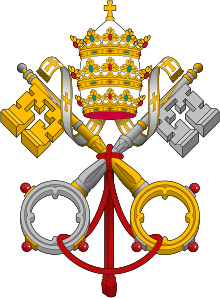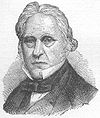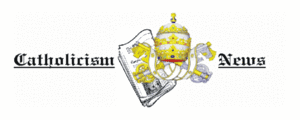Introduction The Catholic Church, also known as the Roman Catholic Church, is the largest Christian church, with 1.39 billion baptized Catholics worldwide as of 2022. It is among the world's oldest and largest international institutions, and has played a prominent role in the history and development of Western civilization. The church consists of 24 sui iuris churches, including the Latin Church and 23 Eastern Catholic Churches, which comprise almost 3,500 dioceses and eparchies located around the world. The pope, who is the bishop of Rome, is the chief pastor of the church. The Diocese of Rome, known as the Holy See, is the central governing authority of the church. The administrative body of the Holy See, the Roman Curia, has its principal offices in Vatican City, a small independent city-state and enclave within the Italian capital city of Rome, of which the pope is head of state. The core beliefs of Catholicism are found in the Nicene Creed. The Catholic Church teaches that it is the one, holy, catholic and apostolic church founded by Jesus Christ in his Great Commission, that its bishops are the successors of Christ's apostles, and that the pope is the successor to Saint Peter, upon whom primacy was conferred by Jesus Christ. It maintains that it practises the original Christian faith taught by the apostles, preserving the faith infallibly through scripture and sacred tradition as authentically interpreted through the magisterium of the church. The Roman Rite and others of the Latin Church, the Eastern Catholic liturgies, and institutes such as mendicant orders, enclosed monastic orders and third orders reflect a variety of theological and spiritual emphases in the church. Of its seven sacraments, the Eucharist is the principal one, celebrated liturgically in the Mass. The church teaches that through consecration by a priest, the sacrificial bread and wine become the body and blood of Christ. The Virgin Mary is venerated as the Perpetual Virgin, Mother of God, and Queen of Heaven; she is honoured in dogmas and devotions. Catholic social teaching emphasizes voluntary support for the sick, the poor, and the afflicted through the corporal and spiritual works of mercy. The Catholic Church operates tens of thousands of Catholic schools, universities and colleges, hospitals, and orphanages around the world, and is the largest non-government provider of education and health care in the world. Among its other social services are numerous charitable and humanitarian organizations. (Full article...) Selected article
 The Roman Catholic Church, officially known as the Catholic Church, is the world's largest Christian church, representing over half of all Christians and one sixth of the world's population. It is made up of one Western and 23 Eastern Catholic churches and divided into 2,782 jurisdictional areas around the world. These Churches look to the Pope, currently Pope Francis, as their highest visible authority in matters of faith, morals, and church governance. The primary mission of the Catholic Church is to spread the message of Jesus Christ, found in the four Gospels, and to administer sacraments that aid the spiritual growth of its members. To further its mission, the Church operates social programs and institutions throughout the world. These include schools, universities, hospitals, missions and shelters, as well as Catholic Relief Services and Catholic Charities that help the poor, families, the elderly and the sick.
Selected image
 Credit: Afernand74 Intercession of Charles Borromeo supported by the Virgin Mary (1714), ceiling fresco by Johann Michael Rottmayr (1654-1730) in the Karlskirche, Vienna. The son of Giberto II Borromeo, conte (count) of Arona, and Margherita de' Medici, Carlo Borromeo was born at the castle of Arona on Lago Maggiore. The aristocratic Borromeo family's coat of arms included the Borromean rings, sometimes taken to symbolize the Holy Trinity. Selected biography
 Charles II was the King of England, Scotland and Ireland from 30 January 1649 until his death. Charles II's father, Charles I, had been executed in 1649 following the English Civil War; the monarchy was then abolished and replaced with a military dictatorship under Oliver Cromwell, who had named himself "Lord Protector". In 1660, shortly after Cromwell's death, the monarchy was restored under Charles II. Unlike his father, Charles II was skilled at managing Parliament. It was during his reign that the Whig and Tory political parties developed. He famously fathered numerous illegitimate children, of whom he acknowledged fourteen. Known as the "Merry Monarch", Charles was a patron of the arts and less restrictive than many of his predecessors. By converting to Roman Catholicism on his deathbed, Charles II became the first Roman Catholic to reign over England since Mary I's death in 1558.
Did you know...

Related portalsFeast Day of May 12
From an early period, Pancras was venerated together with Nereus and Achilleus in a shared feast day and Mass formula on 12 May. In 1595, 25 years after Pope Pius V promulgated the Tridentine Missal, Domitilla was also added. Since 1969, Pancras has been venerated separately, still on 12 May. He is traditionally the second of the Ice Saints.
In the Syriac traditions he is known as Mor Izozoel (Mar Azazael), remembered on 12 May and 12 August. He is the patron saint of children. (Full article...)
Selected quote

News
SubcategoriesTopics
The Holy Bible:
Particular Churches (grouped by liturgical rite):
Things you can do
External resourcesWikiProjectsAssociated WikimediaThe following Wikimedia Foundation sister projects provide more on this subject:
Discover Wikipedia using portals |
































